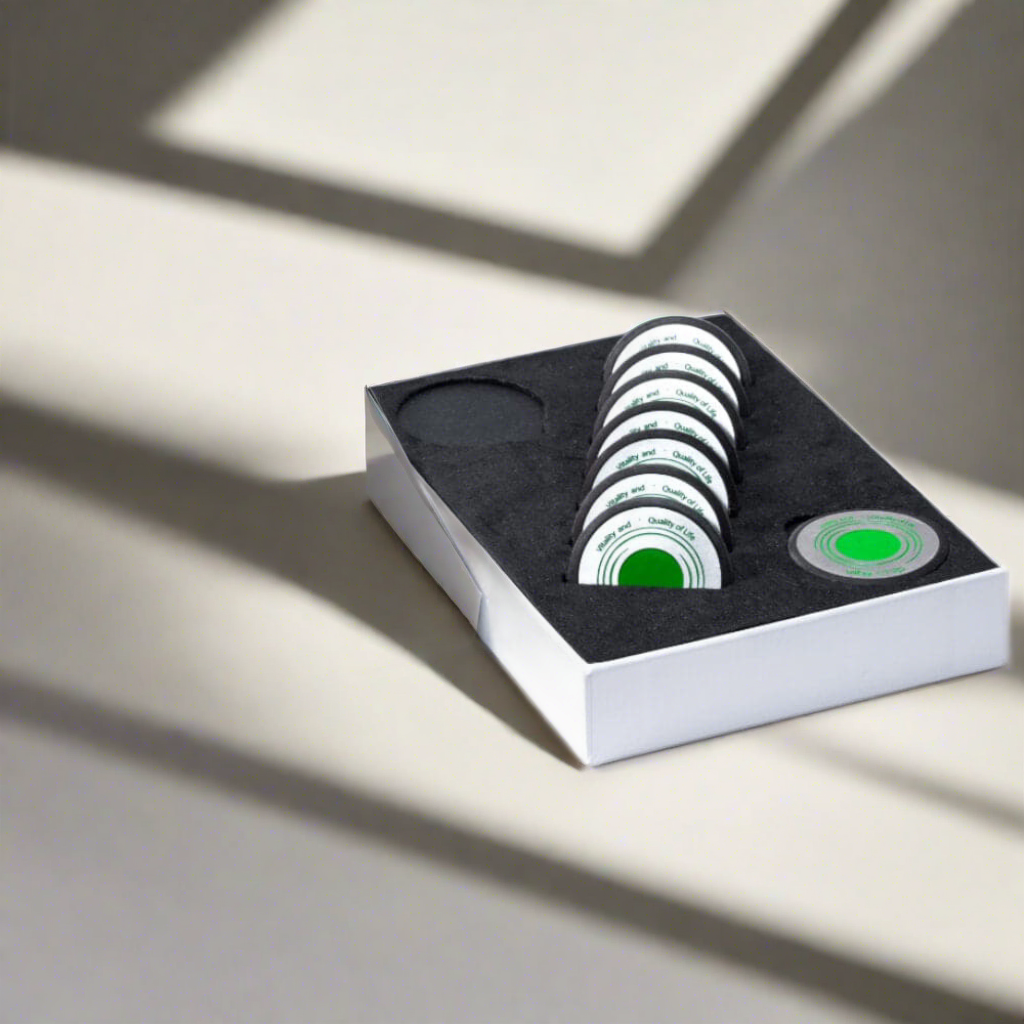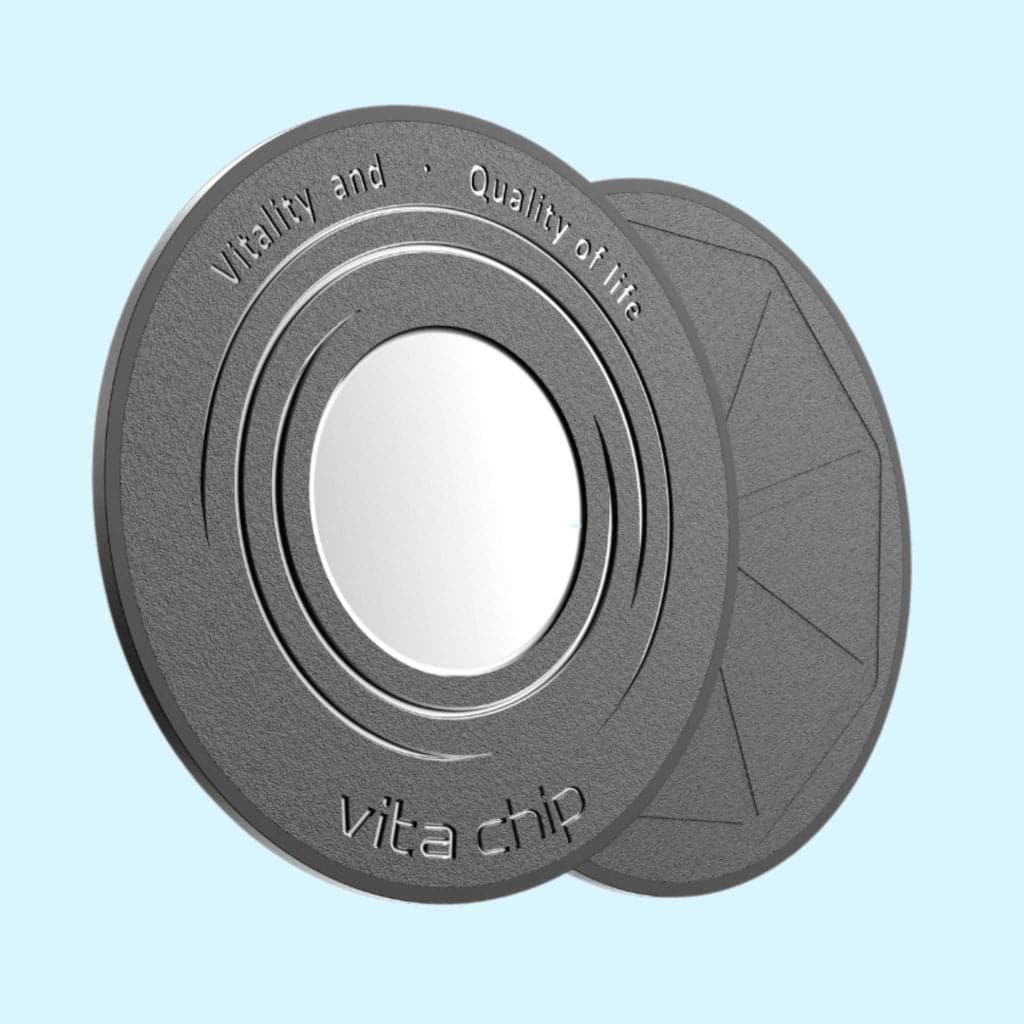-
HarmoniDrive Car EMF Protection

 HarmoniDrive Car EMF Protection
HarmoniDrive Car EMF Protection- Regular price
-
$349.00 $649.00 - Regular price
-
- Sale price
-
$349.00 $649.00
-
LifeSource Water Harmonizer

 LifeSource Water Harmonizer
LifeSource Water Harmonizer- Regular price
-
$299.00 - Regular price
-
$399.00 - Sale price
-
$299.00
-
Quantum 5G Protection Pendant Silver

 Quantum 5G Protection Pendant Silver
Quantum 5G Protection Pendant Silver- Regular price
-
$499.00 - Regular price
-
- Sale price
-
$499.00
-
Vita Chip Electromagnetic Radiation (5G) Protection Devices

 Vita Chip Electromagnetic Radiation (5G) Protection Devices
Vita Chip Electromagnetic Radiation (5G) Protection Devices- Regular price
-
$99.00 $449.00 - Regular price
-
$0.00 - Sale price
-
$99.00 $449.00
-
Vita System Health + Health transmitter for the body

 Vita System Health + Health transmitter for the body
Vita System Health + Health transmitter for the body- Regular price
-
$349.00 $549.00 - Regular price
-
- Sale price
-
$349.00 $549.00
Electromagnetic Fields (EMF) - FAQ
What are electromagnetic fields?
Electromagnetic fields (EMFs) are areas of energy that surround electronic devices. The health effects of EMFs have become a topic of concern due to the proliferation of electronic devices in everyday life. EMFs are classified into two categories: low-frequency and high-frequency fields. Low-frequency EMFs are emitted by devices like power lines and household appliances, while high-frequency EMFs are produced by devices such as microwaves, cell phones, and Wi-Fi routers.The primary concern with EMFs revolves around their potential biological impact on the human body and mind. Research has shown that exposure to high levels of EMFs can have various health effects, though the extent and significance of these effects are still under investigation.
Potential EMF-effects on the body
- Reproductive Health: High levels of EMF exposure have been associated with adverse effects on reproductive health, such as reduced sperm quality and mobility, which can lead to decreased fertility in men. Additionally, pregnant women exposed to high EMFs might face a higher risk of miscarriage and developmental issues in their unborn children (Better Health Channel).
- Neurological Effects: EMFs may affect the nervous system, potentially causing symptoms like headaches, dizziness, and sleep disturbances. There is ongoing research into the long-term impacts of EMF exposure on cognitive functions and the development of neurodegenerative diseases such as Alzheimer's (NIH NIEHS).
- Cardiovascular Problems: Some studies suggest that EMF exposure can lead to cardiovascular issues, including increased heart rate, blood pressure fluctuations, and heart rhythm disturbances. These effects might result from the influence of EMFs on the autonomic nervous system (World Health Organization (WHO)).
- Immune System Suppression: EMF exposure might suppress the immune system, making individuals more susceptible to infections and diseases. Research indicates that EMFs can alter immune cell activity, impacting the body’s ability to respond to pathogens effectively (NIH NIEHS).
- Endocrine Disruption: EMFs can interfere with the endocrine system, affecting hormone regulation. This disruption can lead to various health issues, including thyroid dysfunction and altered production of stress-related hormones like cortisol (World Health Organization (WHO)).
- Skin Problems: Prolonged EMF exposure has been linked to skin issues, such as redness, tingling, and a burning sensation, a condition known as electromagnetic hypersensitivity (EHS) (Better Health Channel).
- Oxidative Stress: EMF exposure can increase oxidative stress in the body, leading to cellular damage. Oxidative stress is associated with aging and the development of chronic diseases (NIH NIEHS).
- DNA Damage: Some studies suggest that EMFs can cause DNA damage, potentially leading to mutations and an increased risk of cancer. This damage may occur through mechanisms involving reactive oxygen species (ROS) (NIH NIEHS).
- Gastrointestinal Issues: EMF exposure has been linked to gastrointestinal problems, such as nausea, loss of appetite, and digestive disturbances. These symptoms might be related to broader impacts on the autonomic nervous system (Better Health Channel).
Potential EMF Effects on the Mind
- Cognitive Impairment: Prolonged exposure to EMFs may lead to cognitive impairments, including difficulties with memory, attention, and learning. These effects are particularly concerning for children, whose developing brains might be more susceptible to EMF exposure (Better Health Channel).
- Behavioral Changes: EMF exposure has been associated with behavioral changes such as increased irritability, anxiety, and depression. These mental health effects may result from the influence of EMFs on brain function and neurotransmitter balance (Better Health Channel).
- Sleep Disorders: Exposure to EMFs, especially at night, can disrupt sleep patterns by affecting melatonin production, a hormone that regulates sleep. Poor sleep quality can lead to chronic fatigue, decreased productivity, and mood disorders (NIH NIEHS).
How can you mitigate EMF radiation?
Given the potential risks associated with EMF exposure, here are 6 steps to minimize exposure. Here are some strategies:
- Distance: Maintain a safe distance from EMF sources, such as avoiding keeping cell phones and Wi-Fi routers near sleeping areas.
- Limit Use: Reduce the time spent using high-EMF-emitting devices, particularly for children.
- Shielding: Use EMF shielding products or for devices that emit high levels of EMFs.
- Wired Connections: Opt for wired connections instead of wireless ones when possible to reduce exposure to radiofrequency EMFs.
- Power Off: Turn off devices when not in use, especially at night, to reduce continuous exposure.
- Regular Check-ups: Regular medical check-ups can help monitor and address any potential health issues arising from EMF exposure.
While more research is needed to fully understand the impact of EMFs on human health, taking precautionary measures can help minimize potential risks (World Health Organization (WHO)) (NIH NIEHS) (Better Health Channel).
Understanding the Differences Between EMF Blockers and EMF Harmonizers
In our increasingly digital world, concerns over electromagnetic fields (EMF) exposure have led to a surge in products designed to mitigate potential health risks. Two common types of these products are EMF blockers and EMF harmonizers. While they aim to address the effects of EMF, their methods and potential benefits differ significantly.
EMF Blockers:
EMF blockers are designed to prevent or significantly reduce the exposure to electromagnetic fields emitted by devices such as cell phones, Wi-Fi routers, and other electronic gadgets. These products work by creating a barrier that either absorbs or deflects the EMF radiation, thus reducing the amount that reaches the user.
Common examples of EMF blockers include specialized cases for smartphones, shields for routers, and even certain types of clothing and paint. The materials used in these blockers, such as metals and conductive fabrics, are chosen for their ability to interfere with and reduce the strength of electromagnetic waves.
The primary benefit of EMF blockers is the direct reduction of exposure. For individuals who believe they are sensitive to EMF or who are concerned about potential long-term health risks associated with high EMF exposure, blockers provide a tangible way to decrease contact with these fields. However, the effectiveness of EMF blockers can vary widely depending on the quality of the product and the specific environment in which it is used.
EMF Harmonizers:
On the other hand, EMF harmonizers take a different approach. Rather than blocking or reducing EMF exposure, harmonizers aim to alter the perceived negative effects of EMF on the human body. They work on the premise that EMF radiation disrupts the body's natural energy field, and that by restoring balance, the harmful effects can be neutralized or minimized.
Harmonizers typically come in the form of pendants, stickers, or chips that can be placed on electronic devices or worn on the body.
These products often utilize a combination of materials to have positive energetic properties, such as crystals or magnets, and sometimes incorporate principles from ancient healing practices or modern biofeedback technologies.
Conclusion:
While both EMF blockers and harmonizers are marketed as solutions to EMF exposure, their methodologies and underlying principles are distinct. EMF blockers focus on reducing or eliminating exposure to electromagnetic fields through physical barriers, while EMF harmonizers aim to mitigate the biological impact of EMF by harmonizing the body's energy field.
What is Vita Chip 2.0? a EMF Harmonizer or a EMF Blocker?
In today’s technologically driven world, electromagnetic fields (EMF) and radiation from devices such as Wi-Fi routers and smartphones have become ubiquitous. While some individuals seek to block these emissions, products like the Vita Chip 2.0 offer a different approach. Instead of blocking EMF, the Vita Chip 2.0 is designed as an EMF harmonizer, transforming potentially harmful electromagnetic radiation into a more harmonious form that is believed to be less disruptive to the human body.
The Vita Chip 2.0 is a small, circular device infused with a proprietary blend of minerals and frequency technology. It is not an EMF blocker that stops radiation from passing through; rather, it is engineered to harmonize the electromagnetic fields emitted by electronic devices. This harmonization process purportedly reduces the stress these fields can cause on the body.
How Does the Vita Chip 2.0 Work?
The Vita Chip 2.0 works on the principle of resonance. The chip is embedded with specific frequencies which interact with the chaotic EMFs produced by devices.
The Vita Chip 2.0 restructures these fields into a more biocompatible form, potentially reducing the adverse effects of electromagnetic pollution. This process is designed to help alleviate symptoms such as fatigue, stress, and sleep disturbances which are associate with EMF exposure.
Key Features and Benefits of Vita Chip 2.0 - EMF Harmonizer
EMF Harmonization: Unlike traditional EMF blockers that aim to create a barrier, the Vita Chip 2.0 modifies the nature of the radiation. It harmonizes EMFs, making them less harmful by transforming the energy into a form that is more aligned with the body's natural frequencies.
Versatile Application: The chip can be used on a wide range of devices, from mobile phones and laptops to home appliances and smart meters. This flexibility allows for comprehensive coverage across various sources of EMF in your environment.
User-Reported Benefits: Many users report improvements in their overall well-being after using the Vita Chip 2.0. Benefits include enhanced sleep quality, increased focus, reduced stress levels, and an overall sense of calm. These effects are attributed to the reduction of EMF stress on the body.
Easy to Use: The Vita Chip 2.0 is simple to apply and does not interfere with the functionality of your electronic devices. Its small size and adhesive backing make it easy to attach to any devic
How to choose in between a EMF Harmonizer vs. a EMF Blocker?
Choosing an EMF harmonizer like the Vita Chip 2.0 over a traditional EMF blocker depends on your goals. While blockers are designed to reduce or prevent EMF from reaching you, they can also limit the functionality of your devices by reducing signal strength. Harmonizers, on the other hand, aim to maintain the functionality of your devices while reducing the potential stress EMFs may cause on your body.
The Vita Chip 2.0 offers a unique approach to managing EMF exposure through harmonization rather than blocking. By restructuring EMFs into a more harmonious form, it aims to provide a balanced and holistic solution to the challenges posed by modern electromagnetic pollution. Whether you are sensitive to EMFs or simply looking for a way to reduce your exposure, the Vita Chip 2.0 presents a versatile and user-friendly option.










